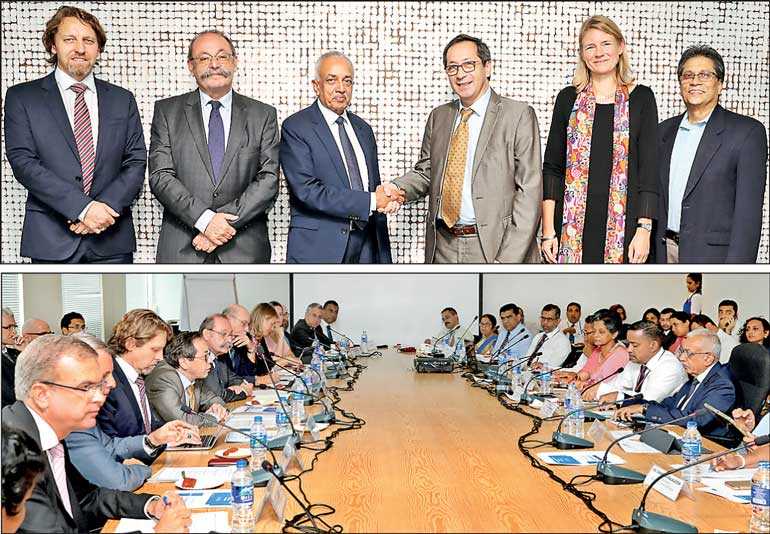Tuesday Feb 17, 2026
Tuesday Feb 17, 2026
Friday, 4 October 2019 00:00 - - {{hitsCtrl.values.hits}}

Strategic Development and International Trade Minister Malik Samarawickrama recently addressed the EU Dialogue, which he co-chaired with EU Ambassador Tung-Lai Margue.
It was Ambassador Margue’s final EU Dialogue session in Sri Lanka, and Minister Samarawickrama thanked him for the excellent joint leadership given to this process. “You were always open and frank with your views, you always advocated for good business practices and held our feet to the fire, and importantly, you also acknowledged when we made progress and had successes. You will be happy to note that this platform has become a unique but practical way that we redefine the business norms in Sri Lanka, and make them friendly to European businesses,” the Minister said.
He said this joint effort between the EU Delegation in Sri Lanka and the Ministry was started in January 2017, to improve the regulatory and business environment in the country in order to increase trade and investment between EU and Sri Lanka. “We value the EU’s GSP Plus concessions, we value the trade assistance program, and we value the political and diplomatic support EU always extend us,” the Minister added.
Following are excerpts of Minister Samarawickrama’s address:
Many people in the private sector mention the ‘Doing Business Index’ a lot. Of course, improving on that is important, and that is why we have eight taskforces working on eight aspects of it, and some of those reforms got recognised this year – lifting our rank by 11 places. However, it is not only the ‘Doing Business Index’ that we are focused on. Not all business climate constraints are neatly codified in an annual report. We recognise that such constraints come from time to time and are varied in their nature. So, we must have mechanisms to resolve them as they come up. So, while we work on the improvements to the ‘Doing Business Index’, we have mechanisms like this EU Dialogue, as well as others like the Exporters Forum, to resolve investors’ issues. We consider these platforms as important.
I know that sometimes many of you may feel that we aren’t progressing fast enough, but understand that making reforms in Government is not easy. We have to keep pushing forward, and changing how things are run in the public sector. When for over a decade, between 2005 and 2015, we had a regime that prioritised discretion over systems, and patronage over transparency, it takes a while to roll that back and bring in better systems. We took a while to reset how Government interacts with business, with investors. Through open dialogue platforms like this one, where we bring the businesses and the Government agencies to one table and get talking. Not a back-door dealing that favour some over others.
Through the EU’s support – the Trade-Related Assistance Program – we have undertaken many policy reform initiatives, ranging from trade facilitation, regulatory change, the NES, the trade remedies process, SME trade capacity building, and the list goes on.
This is just one aspect of the numerous reforms we have undertaken – including the setting up of the first industrial zones in 16 years, the repealing of the contentious ‘Expropriations Act’, removing para-tariffs, bringing in modern tax and foreign exchange laws, and most recently e-procurement systems. These will all begin to work in sync to help improve the climate for foreign business in Sri Lanka. We won’t see the change overnight, we won’t feel the gains overnight. But such is the nature of difficult but ground-breaking reforms. And we will keep building on these gains. We cannot afford to slide back to the systems and policy-orientation of before. Our economy cannot afford it.
Let me take this opportunity to thank Ambassador Tung-Lai Margue and his officials for assisting us in obtaining GSP+ concessions which has greatly helped Sri Lanka to increase exports to the European Union. There has been an increase of over 20% since the re-instatement of GSP+ concessions. I am certain that our exporters will make maximum use of the duty-free access to the EU in the next few years, which will help to improve Sri Lanka’s economy.
EU is Sri Lanka’s largest trading partner with 16% of total in 2018 and more significantly, the EU is Sri Lanka’s main export destination with nearly 30% of our export of goods going to Europe. Fisheries exports have literally doubled since the removal of the fish ban and regaining GSP+.
Once again, I want to thank Ambassador Margue for his excellent partnership with our Ministry’s work overall, and with the EU Dialogue in particular. It is safe to say that his contribution to our trade and investment links will not be forgotten, and its positive impact will be felt long after he is gone. Rest assured, Ambassador, that we will continue with this EU Dialogue with the same genuine focus.